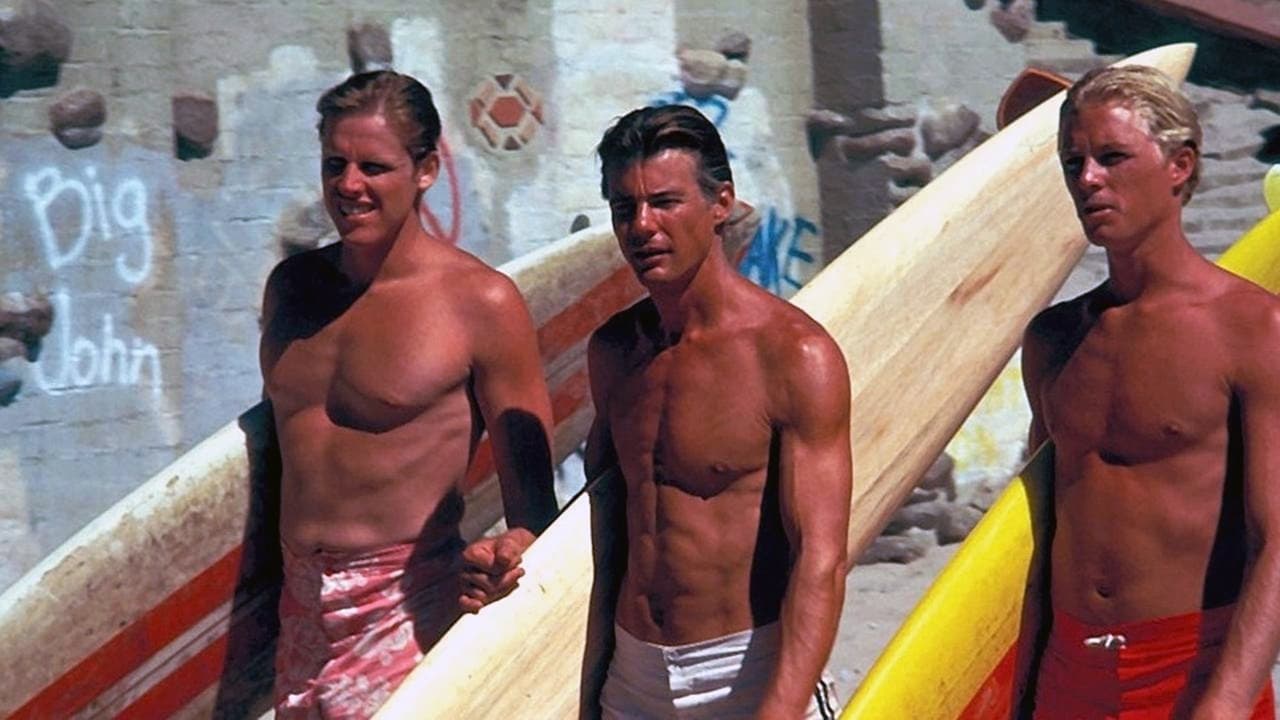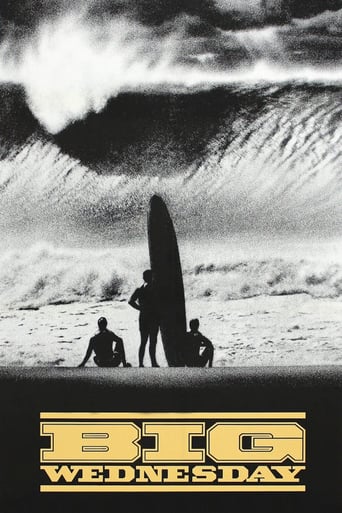

Big Wednesday is a celebration of life on the beach as seen through the eyes of three surfing buddies who only live for riding the wave. Gary Busey, Jan Michael Vincent, and William Katt, three blond California surfer types if there ever were are the three pals with a host of supporting surfing types.The film is four vignettes over a 12 year period from 1962 to 1974 and amazing as it seems I did not hear The Beach Boys once over the soundtrack of the film. Quite an accomplishment for director John Milius in and of itself.William Katt is a straight arrow type and and Gary Busey and Jan-Michael Vincent are screw ups to some degree. Vincent has the most interesting character, he's a surfing god when we first meet him, the idol of all, but he doesn't like the acclaim. He goes through more changes than anyone else in the film.Barbara Hale who is William Katt's mother plays his mother her in her last big screen appearance. If she wasn't Della Street for so many years on Perry Mason she might have wound up doing Donna Reed or Barbara Billingsley or Jane Wyatt type roles. I loved her bearing up under it all demeanor while her house is being wrecked with a wild party.Highlight of the film is the scene at the Selective Service induction center. All the young surfers try to avoid the draft, some with some truly creative ideas. William Katt actually goes to war, the other two avoid it, but Katt's not even trying.Second highlight is the Big Wednesday of 1974 where all three try to prove they still have the right stuff for the waves. The waves were tipping on 20 feet.Big Wednesday is a good buddy/buddy/buddy film about three guys who live for what they love, but who have to realize it's a young man's game.
... View MoreThis is the anti-Beach Blanket Bingo. The message is you CAN'T stay young and irresponsible and surfing-obsessed for your whole life. Big Wednesday starts out looking like a dramatic version of the famed surfing documentary Endless Summer, with its big waves and young, carefree surfers. But life intervenes, with Vietnam and simply the passage of time turning the surfers into embittered middle-aged has-beens. They reunite to surf giant, once-every-seven year waves and try to rediscover what it was about surfing that so fired their imaginations when they were younger. It all manages to be dramatically compelling without being mawkish. Makes a fine companion piece to any other surfing movie.
... View MoreBig Wednesday has major weaknesses as a coming of age film which are made up for by some excellent surfing scenes, particularly towards the end. The plot, or whatever passes for a plot is trite and contrived - quite direction-less. Ideas and coming of age memories of the script writers seem to have been banded together with poor sense of characterization. The idea of showing a character aging by having a ridiculous mustache doesn't show a lot of maturity.However, surfing is at the soul of this film. The last 20 minutes are so good that even those not familiar with the sport would be intrigued. I can understand this being a cult favorite for surfers. The Vietnam drafting section was also something I hadn't seen in a film before and I found it educational.
... View More"Big Wednesday" (1978) is a film that was made for baby boomers. Writer/director John Milius was born in 1944 and the material draws on a ten year span of his life from the early 1960's to the early 1970's. Aside from needing a span of time to qualify as a coming-of-age saga, it was hoped that the long time span would enable it to connect with the entire range of boomers (birth dates from 1945-1963). Almost anyone born during those years will find things in the film they relate to-even shadow boomers with just the second-hand exposure provided by their older siblings. Younger viewers should enjoy the spectacular surfing sequences and might find the other stuff an interesting history lesson. Milius is one of the so-called young auteur directors of the 70's (Coppola, Lucus, Spielberg, Scorsese, De Palma). Unlike the others he did very little after 1984, the year he released "Red Dawn", an embarrassingly moronic and histrionic right-wing propaganda film that alerted an unsuspecting world to his extremist political views. Hollywood insiders already knew about this and the Coen Brothers would use him as a model for John Goodman's character in "The Big Lebowski". But "Big Wednesday" is his masterpiece and it is unlikely that any other writer/director could have brought this story to the screen this effectively. Unfortunately its surfer subject matter did not draw many non-enthusiasts to the theatre; even though the film is a lot more than surfing, containing a very original universal message about the process of living and changing. Low box office led to a re-edit for pay- television, with the more philosophical content was taken out. The current DVD and VHS are of this shorter version, so if you saw the "Big Wednesday" during its theatrical release you will be somewhat disappointed. Structured like a four act play with each transition moving the action ahead a couple of years, "Big Wednesday" follows three young surfers in the LA area (Jan-Michael Vincent, William Katt and Gary Busey). Each plays a talented surfer with Vincent's character approaching legendary status. Surfing plays a big part in their lives (Bruce Surtees' cinematography provides some of the most stunning views of the sport you are likely to ever see) but much of the film takes place away from the beach; with scenes of parties, the military induction center, Tijuana, family life, and romance (a full range of what growing up in southern California was all about). Milius' treatment of surfing is reverential and sometimes even mystical, with a sweeping musical score and a local character (Bear) who is a kind of guru for the sport. In a scene cut from the television version Bear explains the origin and significance of the "Big Wednesday" title. Somehow Milius gets all this right and the film transcends what might have been a pretentious exercise in sport glorification. Milius pays homages to John Ford, initially with the appearance of Ford regular "Hank Worden" as the shopping cart man. Later you see Ford's "The Searchers" (1956) reflected in the relationship between Jack and Peggy, including a scene where Peggy cradles Jack's army uniform in the same manner Martha cradled Ethan's coat. A man and a woman who have had to subordinate their love for each other because of an overriding loyalty.The final scene is truly special as the three main characters manage a convergence for a final day of surfing together, a scene that recalls the freedom and awe of their teenage years, contrasting it with how removed they have gotten from this former way of life. Anyone who has had to choke back their emotions after a nostalgic rush reminds them of what they will never have again, will be moved my this wonderful sequence. Then again, what do I know? I'm only a child.
... View More